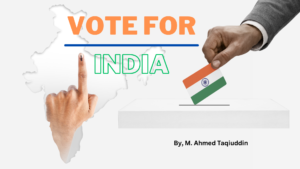Evolution of Voting Rights in India
Author: M. Ahmed Taqiuddin

Introduction:
Voting stands as a cornerstone of the Indian constitution, enabling citizens to democratically elect their representatives. This fundamental right ensures governmental accountability and reflects the collective will of the electorate. However, the discussion around mandatory voting continues to spark debates.
Voting as a Fundamental Right:

In India, voting is not only a fundamental right but also regarded as a civic duty. While it is not legally mandatory, the Election Commission of India actively promotes participation through various campaigns and initiatives. While abstention from voting is permissible, active involvement is vital for the vitality of democracy.
Importance of Voting:

Participation in elections is instrumental in shaping governance and societal trajectories. While some nations enforce voting through legal mandates, others perceive it as a civic obligation. Regardless, voting fosters political stability, governmental accountability, and civic engagement, which are imperative for a healthy democracy.
Universal Adult Franchise:

India’s voting system, often referred to as Universal Adult Franchise, guarantees every eligible individual above 18 years of age the right to vote, irrespective of socioeconomic status, caste, creed, or gender. This foundational principle ensures inclusivity and equality in the electoral process, promoting social cohesion and democratic values.
Evolution of Voting Rights:

The evolution of India’s voting rights framework underscores a transformative journey towards inclusivity, transparency, and democratic empowerment. Over time, several significant advancements have shaped the electoral landscape:
- Eligibility Criteria: From a restrictive system primarily catering to property owners and the educated elite, India has transitioned to universal adult suffrage, granting every citizen above 18 the right to vote. For example, the removal of educational qualifications as a prerequisite for voting has expanded electoral participation among marginalized communities, empowering them to exercise their democratic rights.
- Voting Mechanism: The advent of Electronic Voting Machines (EVMs) has revolutionized the voting process, streamlining operations, enhancing efficiency, and minimizing the scope for malpractices. The successful implementation of EVMs has significantly reduced incidents of electoral fraud, ensuring the integrity of the electoral process.
- Voter Awareness: Extensive voter education campaigns and outreach initiatives have significantly augmented voter awareness and participation, particularly in rural areas. For instance, initiatives like ‘SVEEP’ (Systematic Voters’ Education and Electoral Participation) have effectively disseminated information about voting rights and procedures, leading to a surge in voter turnout.
- Role of Technology: The integration of technology, including EVMs and Voter ID cards, has bolstered the accuracy, transparency, and integrity of the electoral process, thereby reducing the incidence of electoral fraud. For example, the introduction of Voter ID cards has streamlined voter identification procedures, minimizing the possibility of impersonation and electoral malpractices.
- Electoral Reforms: India has undertaken systematic electoral reforms aimed at fortifying the democratic framework, ensuring the conduct of free, fair, and transparent elections with heightened accountability and credibility. The implementation of electoral reforms such as the introduction of NOTA (None of the Above) option on ballot papers has empowered voters to express their dissent and hold political parties accountable.
- Representation: Affirmative action measures, such as the reservation of seats for women in local bodies and legislative assemblies, have facilitated greater inclusivity and representation of marginalized communities in governance. For instance, the reservation of seats for women in Panchayati Raj institutions has led to increased participation of women in grassroots-level governance, fostering gender equality and social empowerment.
- Election Commission’s Role: The Election Commission of India operates autonomously, upholding the integrity of the electoral process, impartially enforcing the electoral code of conduct, and safeguarding the democratic principles of fairness and transparency. For example, the proactive measures taken by the Election Commission to curb electoral malpractices and ensure the smooth conduct of elections have bolstered public trust in the electoral process.
- Voter Participation: Through concerted efforts, voter apathy and disenchantment with the political process have been combatted, leading to a significant increase in voter turnout and citizen engagement in the democratic process. For instance, the ‘My Vote My Right’ campaign launched by the Election Commission has encouraged young voters to actively participate in the electoral process, emphasizing the importance of their role in shaping the nation’s future.
Conclusion:
The evolution of voting rights in India symbolizes a progressive journey towards democratization, inclusivity, and participatory governance. While not mandated by law, voting remains a fundamental tool for citizens to exercise their democratic rights, shape the nation’s trajectory, and uphold the principles of democracy. As India continues its march towards socio-political transformation, the sanctity of the electoral process remains paramount, serving as a beacon of hope for a vibrant and resilient democracy.

😍😍😍